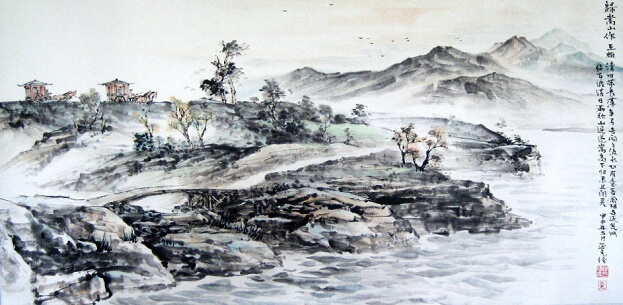Returning to Songshan Mountain
- Poetry of Wang Wei

The limpid river, past its bushes
Running slowly as my chariot,
Becomes a fellow voyager
Returning home with the evening birds.
A ruined city-wall overtops an old ferry,
Autumn sunset floods the peaks.
...Far away, beside Mount Song,
I shall close my door and be at peace.
Five-character-regular-verse
Composed in autumn 734 AD during Emperor Xuanzong's Kaiyuan era, this poem was written by Wang Wei while journeying to reclusive Mount Song after completing mourning for his mother. Having experienced officialdom's vicissitudes, he gradually grew weary of political life, finding solace in Buddhist philosophy and nature. As one of China's Five Sacred Mountains, Mount Song symbolized his pursuit of tranquility beyond worldly concerns. The landscapes described reflect both physical scenery and the poet's nuanced psychological transition—from relief to fleeting melancholy, then to serene clarity—embodying his increasingly detached worldview.
清川带长薄,车马去闲闲。
流水如有意,暮禽相与还。
荒城临古渡,落日满秋山。
迢递嵩高下,归来且闭关。
清川帶長薄, 車馬去閑閑。
流水如有意, 暮禽相與還。
荒城臨古渡, 落日滿秋山。
迢遞嵩高下, 歸來且閉關。
- Why Chinese poems is so special?
- The most distinctive features of Chinese poetry are: concision- many poems are only four lines, and few are much longer than eight; ambiguity- number, tense and parts of speech are often undetermined, creating particularly rich interpretative possibilities; and structure- most poems follow quite strict formal patterns which have beauty in themselves as well as highlighting meaningful contrasts.
- How to read a Chinese poem?
- Like an English poem, but more so. Everything is there for a reason, so try to find that reason. Think about all the possible connotations, and be aware of the different possibilities of number and tense. Look for contrasts: within lines, between the lines of each couplet and between successive couplets. Above all, don't worry about what the poet meant- find your meaning.
- The Pepper Garden
- Mengcheng Mound
- A Boat in Spring on Jo-Ya Lake
- Night at Longxing Temple
- The Abbot’s Hut
- Passing by Monk Rong’s Hermitage
- Farewell to Magistrate Jia Heng
- Winter Night at My Lodging: To Imperial Archivist Chu
- Night in the Taoist Cosmos
- The Temple in Crimson Mist